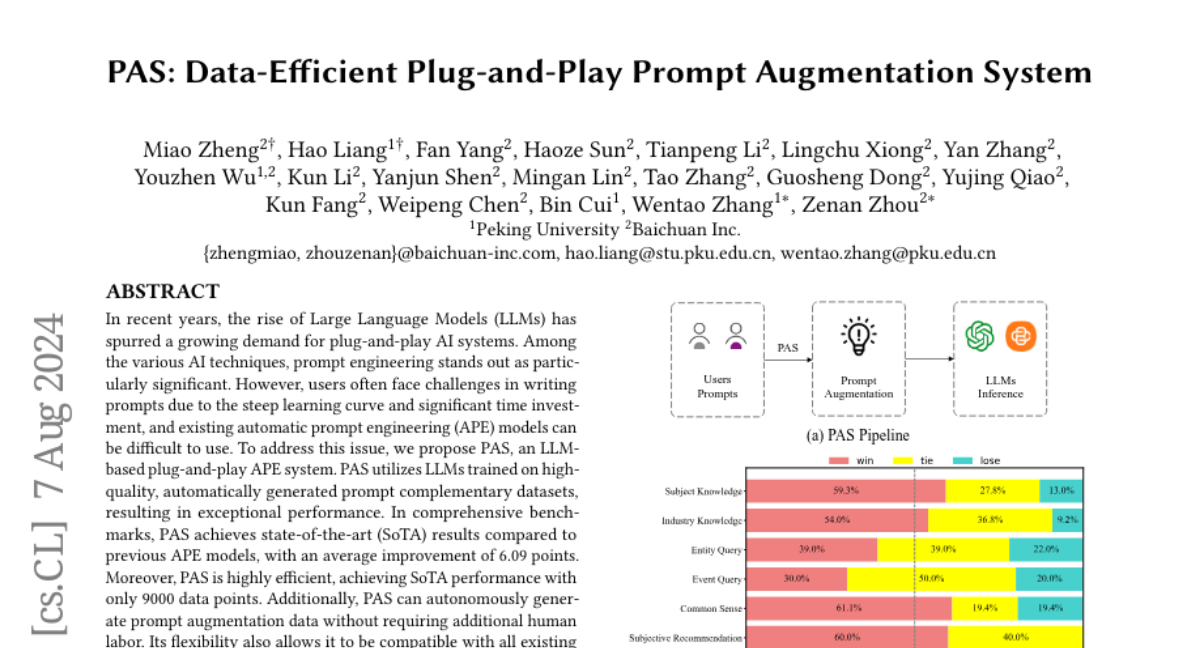PAS: Data-Efficient Plug-and-Play Prompt Augmentation System
Miao Zheng, Hao Liang, Fan Yang, Haoze Sun, Tianpeng Li, Lingchu Xiong, Yan Zhang, Yozhen Wu, Kun Li, Yanjun Sheng, Mingan Lin, Tao Zhang, Guosheng Dong, Yujing Qiao, Kun Fang, Weipeng Chen, Bin Cui, Wentao Zhang, Zenan Zhou
2024-07-09

Summary
This paper talks about PAS, a new system designed to improve how people interact with large language models (LLMs) by automatically enhancing the prompts they use. It makes it easier for users to get better results from AI without needing to be experts in writing prompts.
What's the problem?
The main problem is that writing effective prompts for LLMs can be challenging and time-consuming. Many users struggle to create the right prompts, which can lead to poor results from the AI. Existing automatic prompt engineering systems can be complex and hard to use, making it difficult for everyday users to benefit from them.
What's the solution?
To solve this issue, the authors developed PAS, which stands for Prompt Augmentation System. PAS is a plug-and-play system that automatically improves user prompts by generating complementary prompts based on a dataset of high-quality examples. This means that when a user provides a basic prompt, PAS enhances it without changing its original meaning, helping the LLM produce more accurate and relevant responses. The system has been tested and shown to perform better than previous methods, achieving impressive results with only 9,000 examples for training.
Why it matters?
This research is important because it makes AI more accessible and effective for everyone. By simplifying the process of prompt engineering, PAS allows more people to use LLMs successfully, whether for writing, coding, or other tasks. This could lead to more innovative uses of AI technology across various fields, enhancing productivity and creativity.
Abstract
In recent years, the rise of Large Language Models (LLMs) has spurred a growing demand for plug-and-play AI systems. Among the various AI techniques, prompt engineering stands out as particularly significant. However, users often face challenges in writing prompts due to the steep learning curve and significant time investment, and existing automatic prompt engineering (APE) models can be difficult to use. To address this issue, we propose PAS, an LLM-based plug-and-play APE system. PAS utilizes LLMs trained on high-quality, automatically generated prompt complementary datasets, resulting in exceptional performance. In comprehensive benchmarks, PAS achieves state-of-the-art (SoTA) results compared to previous APE models, with an average improvement of 6.09 points. Moreover, PAS is highly efficient, achieving SoTA performance with only 9000 data points. Additionally, PAS can autonomously generate prompt augmentation data without requiring additional human labor. Its flexibility also allows it to be compatible with all existing LLMs and applicable to a wide range of tasks. PAS excels in human evaluations, underscoring its suitability as a plug-in for users. This combination of high performance, efficiency, and flexibility makes PAS a valuable system for enhancing the usability and effectiveness of LLMs through improved prompt engineering.